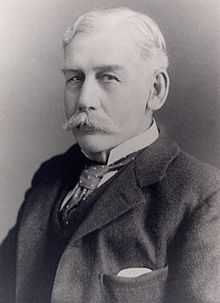Richard Lydekker
| Richard Lydekker | |
|---|---|
 | |
| Born |
July 25, 1849 London, England |
| Died |
April 16, 1915 Harpenden, England |
| Nationality | English |
| Fields | |
| Institutions |
Trinity College, Cambridge Natural History Museum |
| Notable awards | Lyell Medal |
Richard Lydekker (25 July 1849 – 16 April 1915) was an English naturalist, geologist and writer of numerous books on natural history.
Biography

Lydekker was born in London, and educated at Trinity College, Cambridge, where he took a first-class in the Natural Science tripos (1872).[1] In 1874 he joined the Geological Survey of India and made studies of the vertebrate paleontology of northern India (especially Kashmir). He remained in this post until 1882. He was responsible for the cataloguing of the fossil mammals, reptiles and birds in the Natural History Museum (10 vols., 1891).[2]
He was influential in the science of biogeography. In 1895 he delineated the biogeographical boundary through Indonesia, known as Lydekker's Line, that separates Wallacea on the west from Australia-New Guinea on the east.[2]
Lydekker attracted amused public attention with a pair of letters to The Times in 1913, when he wrote on 6 February that he had heard a cuckoo, contrary to Yarrell's History of British Birds which doubted the bird arrived before April. Six days later on 12 February 1913, he wrote again, confessing that "the note was uttered by a bricklayer's labourer". Letters about the first cuckoo became a tradition in the newspaper.[3]
Works
- A Manual of Palaeontology (with Henry Alleyne Nicholson, 2 vols., 1889),
- Phases of Animal Life (1892)
- The Royal Natural History[4] (with W. H. Flower, 12 vols., 1894-6)
- The Wild Animals of India, Burma, Malaya, and Tibet (1900).
- The living races of mankind: a popular illustrated account of the customs, habits, pursuits, feasts and ceremonies of the races of mankind throughout the world By Henry Neville Hutchinson, John Walter Gregory, Richard Lydekker (1902) D. Appleton.
Lydekker was a contributor to Encyclopædia Britannica.
See also
- Australia (continent)
- Wallace Line
- Wallacea
- Weber Line
Notes
- ↑ "Lydekker, Richard (LDKR867R)". A Cambridge Alumni Database. University of Cambridge.
- ↑ 2.0 2.1
 Chisholm, Hugh, ed. (1922). "Lydekker, Richard". Encyclopædia Britannica (12th ed.). London & New York.
Chisholm, Hugh, ed. (1922). "Lydekker, Richard". Encyclopædia Britannica (12th ed.). London & New York. - ↑ Gregory, Kenneth (1976). First Cuckoo: Letters to "The Times", 1900-75. Allen & Unwin.
- ↑ "The Royal Natural History". Archive.org. Retrieved 2012-06-12.
External links
| Wikisource has original works written by or about: |
 Media related to Richard Lydekker at Wikimedia Commons
Media related to Richard Lydekker at Wikimedia Commons- Partial bibliography at DinoData
- Lydekkers publications about rhinos
- map of Wallace's, Weber's and Lydekker's lines
- BDH Online versions of some Richard Lydekker publications.
- Harpenden History: The Lydekkers of Harpenden Lodge — 1853-1979
|